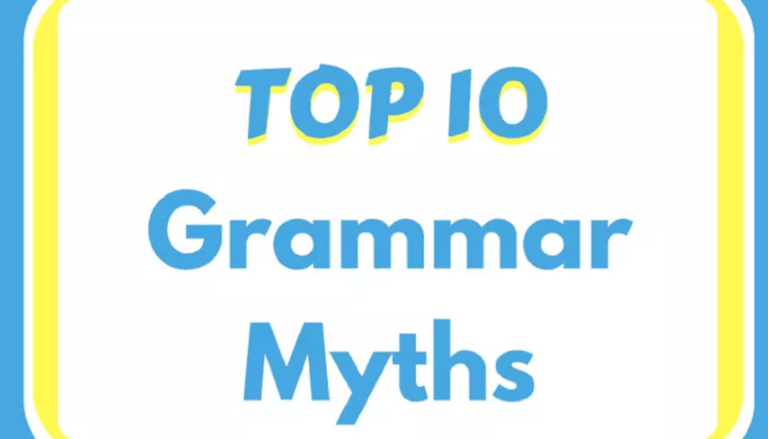March 4 is National Grammar Day, so I have a special top-10 show to celebrate the occasion, and before you argue with me, read the whole explanation about why each of these is a myth. Then, get all of these tips in one place with my National Grammar Day playlist on Spotify.
Grammar Girl’s Top 10 Language Myths
10. A run-on sentence is a really long sentence
Wrong! They can actually be quite short. In a run-on sentence, independent clauses are squished together without the help of punctuation or a conjunction. If you write “I am short he is tall,” as one sentence without a semicolon, colon, or dash between the two independent clauses, it’s a run-on sentence even though it has only six words. (See episode 655 [text, audio] for more details.)
9. You shouldn’t start a sentence with the word ‘however’
Wrong! It’s fine to start a sentence with “however” so long as you use a comma after it when it means “nevertheless.” (See episode 837 for more details.)
8. ‘Irregardless’ is not a word
Wrong! “Irregardless” is a bad word and a word you shouldn’t use, but it is a word. “Floogetyflop” isn’t a word—I just made it up and you have no idea what it means. “Irregardless,” on the other hand, is in almost every dictionary labeled as nonstandard. You shouldn’t use it if you want to be taken seriously, but it has gained wide enough use to qualify as a word. (See episode 600 for more details.)
7. There is only one way to write the possessive form of a word that ends in S
Wrong! It’s a style choice. For example, in the phrase “Kansas’s statute,” you can put just an apostrophe at the end of “Kansas” (that’s AP style) or you can put an apostrophe S at the end of “Kansas” (that’s Chicago style). Both ways are acceptable. (See episode 713 for more details.)
6. Passive voice is always wrong
Wrong! In passive voice, the subject of the sentence isn’t the person or the thing taking the action. In fact, in a passive voice sentence, the actor is often completely left out of the sentence. An example is “Mistakes were made,” because it doesn’t say who made the mistakes. Your writing is often stronger if you make your passive sentences active, but if you don’t know who is responsible for an action, passive voice can be the best choice. (See episode 302 for more details.)
Almost everyone believes at least one of these myths.
5. ‘I.e.’ and ‘e.g.’ mean the same thing
Wrong! “E.g.” means “for example,” and “i.e.” means roughly “in other words.” You use “e.g.” to provide a list of incomplete examples, and you use “i.e.” to provide a complete clarifying list or statement. (See episode 539 for more details.)
4. You use ‘a’ before words that start with consonants and ‘an’ before words that start with vowels
Wrong! You use “a” before words that start with consonant sounds and “an” before words that start with vowel sounds. So, you’d write that someone has “an MBA” instead of “a MBA,” because even though “MBA” starts with M, which is a consonant, it starts with the sound of the vowel E—MBA. (See episode 376 for more details [text, audio].)
3. It’s incorrect to answer the question ‘How are you?’ with the statement ‘I’m good’
Wrong! You probably learned that verbs need to be modified by adverbs (such as “well”), but “good” isn’t modifying “am” in the sentence “I am good.” Instead, “good” is acting as the subject complement and modifying the pronoun “I.” It’s also fine to answer “I’m well,” but some grammarians believe “I’m well” should be used to talk about your health and not your general disposition. (See episode 586 for more details that use “bad” and “badly” as examples.)
2. You shouldn’t split infinitives
Wrong! Nearly all grammarians want to boldly tell you it’s OK to split infinitives. An infinitive is a verb form that is usually made up of the word “to” followed by a verb. An example is “to tell.” In a split infinitive, another word separates the two parts of the verb. “To boldly tell” is a split infinitive because “boldly” separates “to” from “tell.” (See episode 454 for more details.)
- 1. You shouldn’t end a sentence with a preposition
Wrong! You shouldn’t end a sentence with a preposition when the sentence would mean the same thing if you left off the preposition. That means “Where are you at?” is wrong (or at least annoying) because “Where are you?” means the same thing. But there are many sentences where the final preposition is part of a phrasal verb or is necessary to keep from making stuffy, stilted sentences: “I’m going to throw up,” “Let’s kiss and make up,” and “What are you waiting for” are just a few examples. (See episode 800 for more details.)
You can find more information about each of these myths in the Grammar Girl archives.




